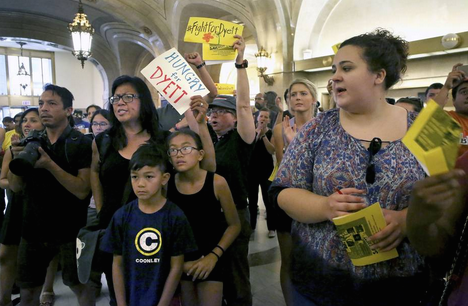By Tyler Durden | ZeroHedge.com | Sep 8, 2015
Last month, we noted with some incredulity that Illinois is now paying lottery winners in IOUs. Long story short, the state’s inability to pass a budget means big winners will have to wait on their prize money, a ridiculous situation which prompted one Illinoisan to remind state officials that “if we owed the state money, they’d come take it and they don’t care whether we have a roof over our head; our budget wouldn’t be a factor.” State Rep. Jack Franks agreed, noting that the “government is committing fraud on the taxpayers.”
The lottery debacle is just the latest example of Illinois’ deepening fiscal crisis which was catapulted into the national spotlight in May when a state Supreme Court decision that struck down a pension reform bid prompted Moody’s to cut the city of Chicago into junk territory. Since then, the media has been awash with tales of the labyrinthine, incestuous character of the state’s various state and local governments and the deplorable condition of the state’s pension system.
The fallout from the budget crisis is far-reaching in the state with the latest example being Chicago’s public school system (the third-largest in the country), which opened this week with a budget shortfall of nearly a half billion dollars. Here’s WSJ with the story:
Chicago Public Schools—with 394,000 students and nearly 21,000 teachers—has closed more than half of a projected $1.1 billion shortfall through cuts, borrowing and other means, but is looking to the state to come up with the rest. The school board warns of deep cuts later this year if Illinois, which faces its own fiscal crisis, doesn’t deliver an additional $480 million in the coming months, representing roughly 8% of annual district spending.
“It is like the board is a desperate gambler at the end of their run,” said Jesse Sharkey, vice president of the Chicago Teachers Union, in a recent speech.
“We are really now at a point where further cuts would reach deep into the classroom,” said Forrest Claypool, who was named chief executive of the city schools in July.
Since 2011, the school board has made nearly $1 billion in cuts—including $200 million this year that involved eliminating 1,400 positions, mostly through layoffs. Enrollment declines, due to shifting demographics and Chicago’s shrinking population, have led to school closings, including nearly 50 elementary schools in 2013 alone.
Mayor Rahm Emanuel has clashed with the teachers union, which went on strike three years ago and is currently without a contract. Another strike isn’t out of the question as the two sides are wrestling over the district’s effort to get teachers to pay more of their pension costs.
A group of parents, educators and activists with the support of union leaders launched a hunger strike Aug. 17 in a push to reopen a closed high school in a historically black neighborhood on the city’s South Side. The group argues the board concentrates money in Chicago’s wealthy, predominantly white neighborhoods. Hispanic and black students make up a vast majority of enrollment in city schools, and more than 85% of students are considered economically disadvantaged.
 Weaponized News New World Order politics, economics and current events
Weaponized News New World Order politics, economics and current events







